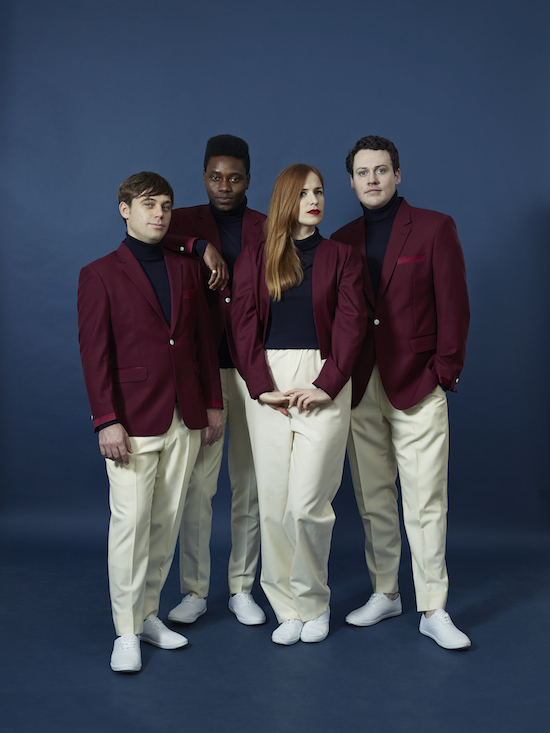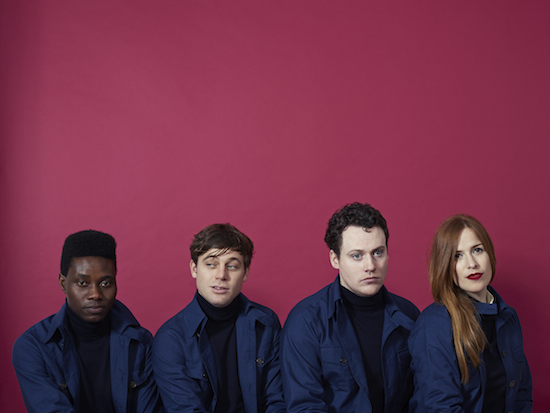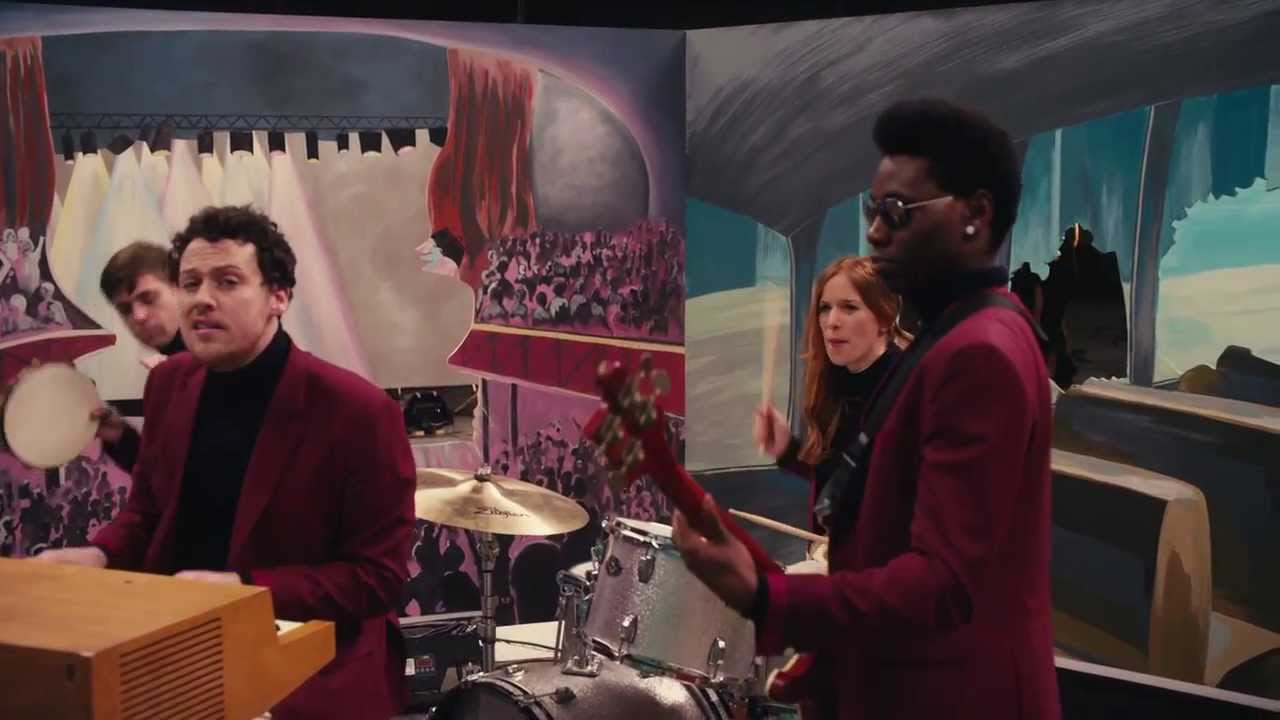A few weeks before Metronomy’s fourth album is due to be released, songwriter, producer and all-seeing-eye of the band Joe Mount is sitting in a Kings Cross wine bar eating from a cheese board. There’s quince jelly. That’s how serious it is. It could appear that Mount, with his cheese, has made it and that this album will, as most outlets are predicting, storm the charts to become a genuine crossover success. But there’s a problem there, see, because the sound of the new LP, Love Letters, is so much bleaker and thinner than the seductive, clean pop of its predecessor, 2011’s The English Riviera.
The songs are heartbreak, anxiety and thrifty marriage proposals set to the music of ABBA, had they been recorded at Kling Klang. As it happens, Love Letters was recorded at Toerag Studios in East London, previously a haven for garage rock revivalists seeking an authentic 8-track sound, but now the setting for Mount’s best songs yet. Between mouthfuls of what appears to be a thick Yarg and a variety of attractively veined blue cheeses, he argues that it’s not commercial suicide and explains why you should never attempt to meet Paul McCartney.
The first thing we notice on the record is your voice, and how thin and naked it sounds. On previous records, you would’ve double-tracked it. What’s changed?
Joe Mount: What’s nice about that track, ‘The Upsetter’, is that everything on it, the vocal, the drum machine, the guitar, the organ, it’s all live. It’s just how it sounded in the room. I hadn’t ever tried to sing in that register.
You can definitely hear a struggle in there, in the nicest possible way.
JM: Yeah! [makes strangled vocal sound] It does sound different. One thing I’ve picked up as I keep doing stuff is that sound can have a purpose. The old me would think, "You double track this, you make it sound more like Ozzy Osborne." You know, you flesh it out so the sound is more lush for all kinds of reasons. Recording to 8-track means that you don’t have that luxury. Then, listening to it without that luxury, that quality in itself sounds so unusual. You haven’t heard that from me before, you haven’t heard it on a previous album. It’s arresting.
For me, it sets the whole tone for the record. It’s just that bit more downbeat and sparse than The English Riviera, isn’t it?
JM: I guess ‘downbeat’ has different connotations, but I know what you mean. Sonically it’s definitely smaller.
I’ve picked out one lyric from the single, ‘I’m Aquarius’, because even though the song sounds great on the radio, the lyrics don’t contain the most radio-friendly sentiment: "I’m taking back the ring to where I bought it from."
JM: [Laughs] I never write very literal songs. I take ideas and things that have gone on and turn them into songs. There’s nothing about that song which is true, but in my head, none of that really matters anyway. I quite like it when people might think that I have some dysfunctional relationship. I imagined someone half-heartedly buying a ring for someone at a Cash Converters-type shop and then thinking, "I can pawn it back!" like it doesn’t matter. I’m getting much more excited about what lyrics can do.
Do you like the artifice of taking on a character in a song?
JM: This is what I mean, it’s something I’m only beginning to get into. I’ve not at one point thought about what I’m doing. I’m not at the stage where I’d approach a song and go, "I’m going to write this as a character." I’m sure I’ll become more articulate about what I’m trying to do, but for now there are certain songs, like ‘I’m Aquarius’, for which I can visualise a little story. In that song, it is about characters and not about me. I imagine the type of people that they are. But then, they’re probably vaguely based on people that I know or relationships that I’ve had… that’s where I start to fall apart describing it.
I interviewed you around the release of The English Riviera, and back then you told me that you were worried about sounding too melancholy – your girlfriend was even getting slightly annoyed at the way you were depicting relationships in your songs. With this record, the melancholy is even stronger. Did you just stop worrying?
JM: Well obviously I’ve been going out with that girlfriend now for three more years, so I’m much more relaxed about the idea that she would misconstrue something. Doing all these interviews, I’m starting to build an image of myself which I didn’t have before. I must be drawn to a certain kind of melancholy, but it’s never… look, I’m really happy! I just had a baby with my girlfriend!
As far as I’m concerned, songs are always about relationships. Pop music is always about boys liking girls, people breaking up and all that kind of stuff. Or cars. Modern pop music is very much saying, "I’m at a party, I’m having a good time." And lyrically, it’s literally saying, "I’m at a party, I’m having a good time." Fuck me, that’s so boring! We’ve all been to a party, we know how brilliant parties are. If Flo-Rida did a song about the post-party depression or his woes…
I would listen to that song.
JM: Exactly! Because it says something a bit more interesting than, "I’m at a party… where are you?"
It’s probably fair to align your new songs with sad ABBA songs. Like, ‘The Day Before You Came’, mid-divorce ABBA. Why do you think pop music is so good at being sad?
JM: The songs on this album could only ever hope of being as pop as ABBA, but musically you need to have something that works. Music is the language of dancing and movement, so you always have to have that. Pop music works best if musically it’s connecting with your body and lyrically it’s giving something you can relate to or listen to as a story. It can be quite manipulative, but I don’t think that matters. Even if you’re being manipulated, your body can’t argue.
If you’re singing those songs, for want of a better phrase, "in character", are you feeling the things that the character is feeling? Or are you cynical Joe Mount, lying through your teeth on stage and laughing at the poor saps in the audience afterwards?
JM: No! Everything that I would ever write about, to have those ideas, you have to have felt something that’s in that area of feeling. I don’t think I’ve had a particularly rough time, but I can really vividly remember the times when it has been like that. I feel like I’m writing with some authority. But not total authority.
One of the saddest moments on the record, for me, is the intro to ‘Love Letters’, which sounds like a severely slowed-down Madness song.
JM: Have you played it sped up? Because it actually is ‘Baggy Trousers’.
So where did it come from? It’s very out of kilter with the song itself, which is obviously a single.
JM: Because the song comes in so like… [mock-surprised] "Aaah!", it almost deserves its own intro. I always think about how people are first going to experience songs, and hopefully people’s first experience of that song, with the intro, will be in the context of the album. So they’ll have three sparse drum-machine tracks and then a slightly mournful horn thing, then the record opens up. It’s more designed for the album.
Feature continues after portrait

Are you a control freak?
JM: With my music, I’m very particular. But then that’s the only thing in my life that I’m like that about. I’m not like that, I’m a very easy-going guy. If you’re allowed to preserve that part of you for something, it’s fine if it’s for the only creative thing you do. It could come across like I’m a control freak because I write the music and I produce the records – if I was producing other people’s records I would still want things done the way I want them to be done. So it could appear that I’m a control freak and I do know what I like. I want something done a certain way because that’s the best way for it to be. Hopefully it’s always worth caring as much as I do.
The press have always said that Metronomy are about to cross over and be properly famous. What level of fame would you like to have?
JM: [laughs] I’m already totally fine. For me, the dream of being in a band is achieved when you get a record deal, and that happened a while ago. So now I would like to keep releasing records while people are interested. People often equate success with the size of venue you play, and it really doesn’t work like that with me. I don’t know if it works with many people. My aspirations would be much more to do with records… I don’t know, I think I’ve done everything.
Are people still approaching you for remix work?
JM: I don’t know if my manager has stopped forwarding them to me, but I don’t do them any more. The last suggestion was that I remix a Paul McCartney song. And I fucking love Paul McCartney. I don’t want to get too close to him. I don’t want to add to the desecration of The Beatles’ good name.
Well, The Beatles’ continuing good name is an arguable thing these days, but that must have been a bit of a wrench to turn down, surely?
It wasn’t really. He’s still alive, Ringo Starr is still alive, and I feel like every year that I’m making music the chances of our paths crossing get bigger and bigger. And I would love that to happen, but I’d be so afraid. Once you’re chummy with Paul McCartney, what else do you have? A friend of mine is friends with Sean Lennon. I remember watching Sean Lennon at Glastonbury playing to an empty tent, thinking "Oh my God, you’ve got rock history coursing through your veins and there’s like ten people here." I was amazed at how he looked like his dad. Anyway, this friend of mine is now hanging out with him, and I feel like that must be really weird, because this friend of mine is obsessed with The Beatles. It’s too close to what is sacred, you have to get away! So yeah, remixes, no.
Metronomy headline Field Day on June 7; for full details and tickets, head to the festival’s website




